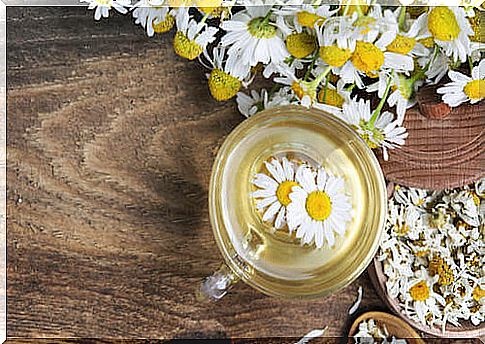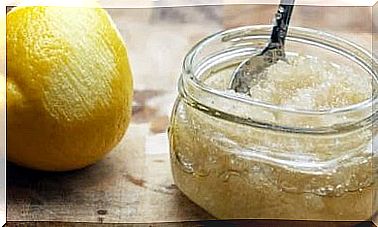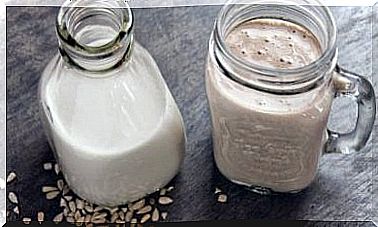Chamomile Infusion: Properties And Benefits

Chamomile infusion is known for its medicinal uses. Although it is not intended to cure any disease, it may help relieve some symptoms. Discover its advantages.
Chamomile infusion is a natural drink that has become popular for its interesting medicinal uses. Although many of its uses come from popular literature, there are currently many different studies supporting its properties.
The plant belongs to the Asteraceae family, which has many different species. However, the most commonly used infusions are Matricaria chamomilla and Matricaria nobilis . What are the main features of chamomile? What benefits are attributed to him? Discover it in our article!
Chamomile infusion – properties
Chamomile infusion is obtained from the dried flowers of this plant, infused with water. It is characterized by a light floral aroma and a mild taste, pleasant to the palate. Moreover, as detailed in the article published in Pharmacognosy Reviews, it concentrates bioactive compounds with therapeutic potential.
In particular, it contains substances such as:
- Sesquiterpenes.
- Flavonoids.
- Coumarins.
- Polyacetylenes.
Its composition, which contains about 120 chemical ingredients, gives the plant various health properties. Therefore, it is said that both the infusion and the extracts and other forms of chamomile have antibacterial, anti-inflammatory, antioxidant, anxiolytic and antispasmodic effects.

Chamomile infusion – the main advantages
In folk medicine, chamomile is one of the heroes. Although it is known today that it should not be the drug of first choice for all diseases, there are those who use it as a supplement or to alleviate the symptoms of certain diseases. How can it help us?
1. It helps to relieve menstrual pain
The phenolic compounds in chamomile infusion have an antispasmodic effect, which helps to relieve menstrual pain. In a study published in the Iranian Journal of Obstetrics, Gynecology and Infertility, women who consumed this tea for a month were able to reduce the severity of dysmenorrhea.
On the other hand, as it is a relaxing drink, participants also reported less period anxiety. Some hypotheses suggest that the plant reduces the production of prostaglandins, substances responsible for pain and inflammation. In both cases, further research is required.
2. Strengthens the digestive system
The most famous are the digestive properties of chamomile infusion. For hundreds of years, this drink has been prepared to relieve gastrointestinal ailments such as gas, indigestion, diarrhea, nausea and vomiting.
There is not much evidence on this point yet. However, a review in the Electronic Physician Journal details in detail that these effects are attributed to chamomile’s antibacterial, anti-inflammatory, and relaxing properties.
3. It improves the quality of sleep
There is no natural herb that can combat sleep disorders on its own. Still, some plants, such as chamomile, help you sleep better. Thanks to the content of apigenin, which is a type of antioxidant, it stimulates the receptors in the brain and helps fight insomnia.
In a study published in the Journal of Advanced Nursing , postpartum women who drank chamomile tea for two weeks reported improved sleep quality. They also showed fewer depressive symptoms associated with difficulty sleeping.
4. Helps to control blood glucose levels
Improving eating habits and lifestyle is essential to controlling blood glucose levels. However, for certain increases in glucose, it is beneficial to consume drinks such as chamomile tea. For what reason?
Research suggests that plant extracts help stimulate the functions of the pancreas, the organ responsible for the production of insulin. The latter is the hormone responsible for regulating sugar levels in the body. While evidence is still lacking, the findings are promising.
5. It helps to take care of the heart
The antioxidants in chamomile tea, especially the flavonoids, have a beneficial effect on heart health. Of course, this does not mean that it can replace treatment for heart disease. Simply introduced into your daily diet helps to reduce the risk of disease.
A short study published in the Journal of Endocrinological Investigation found that diabetic patients who consumed chamomile tea with meals improved their total cholesterol, triglycerides, and bad cholesterol levels.
What other benefits does chamomile tea have?
The use of chamomile tea and other forms has spread throughout the world. For this reason, other benefits are attributed to the drink in addition to those mentioned above. It should be noted that many of these conclusions come from anecdotal data and lack evidence:
- Anxiety and depression: The calming properties of chamomile tea are beneficial for conditions of mental stress such as anxiety and depression. While it is usually used for this purpose in aromatherapy, it is also useful to consume it as an infusion.
- Skin health: Topical application of chamomile has positive effects in relieving skin symptoms such as irritation, redness, and flaking. There are even some who use it for burns or problems like eczema.
- Cold : Inhaling the vapors of hot chamomile tea acts as an aid against nasal congestion and irritation caused by the common cold.
- Caring for your bones: Evidence of consuming chamomile and preventing bone disease is still weak. Still, some hypotheses suggest that this drink has an anti-estrogenic effect that helps prevent bone loss.

Who should avoid chamomile tea?
For most healthy adults, drinking chamomile tea is safe and risk-free. To date, there are no reports of fatal or toxic adverse reactions following consumption of this drink. However, it is not recommended in the following cases:
- A history of allergies to chamomile or daisy plants.
- Previous episodes of pollen allergy.
- People with chronic kidney or liver disease should consult a doctor.
- Babies and toddlers.
Chamomile tea – what should you remember?
Chamomile tea, whether as an infusion or in other forms, serves as a supplement to relieve the symptoms of certain medical conditions. However, it should in no case be a substitute for treatment.
Those who wish to consume this plant as an infusion can safely consume 2 or 3 cups a day. Still, if you suffer from any medical condition or are taking any medications, it is best to consult a physician.









